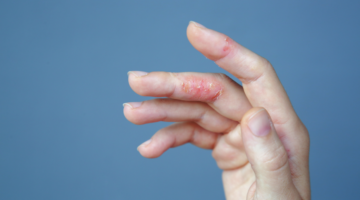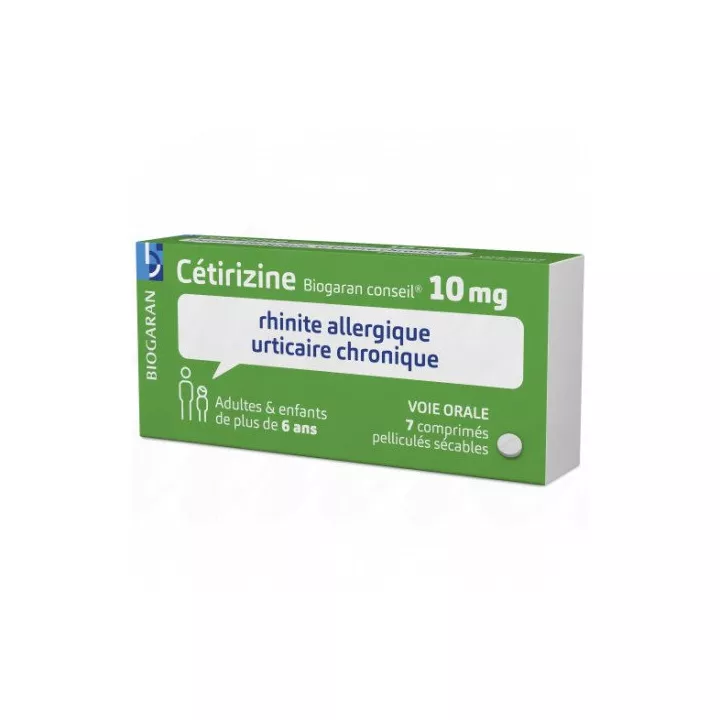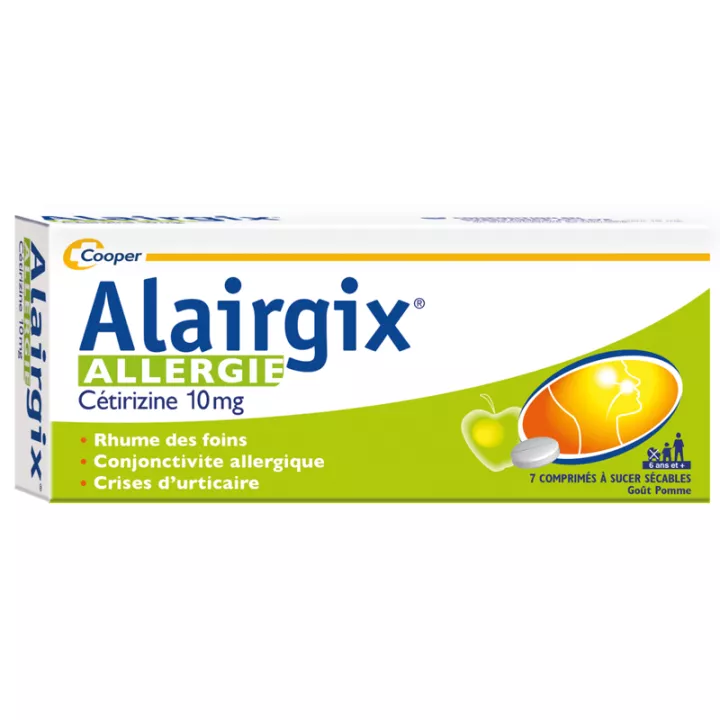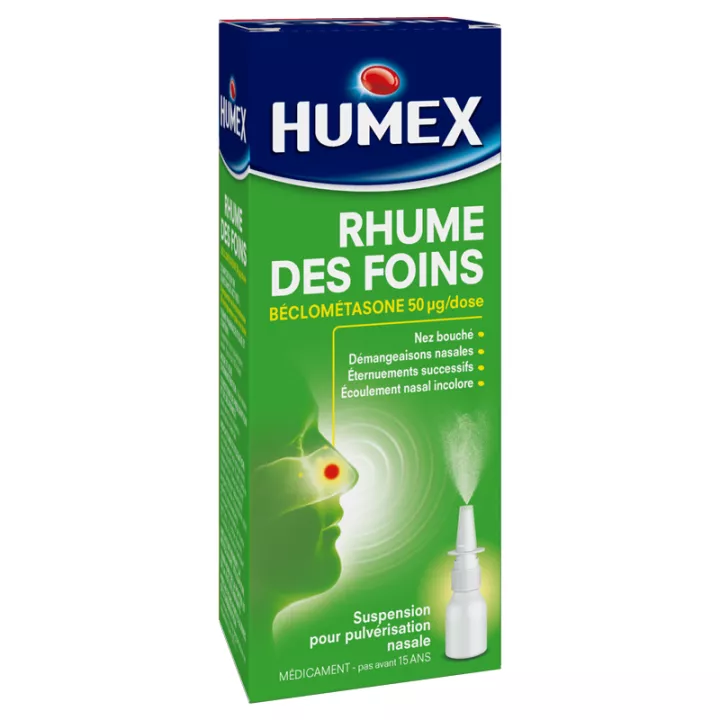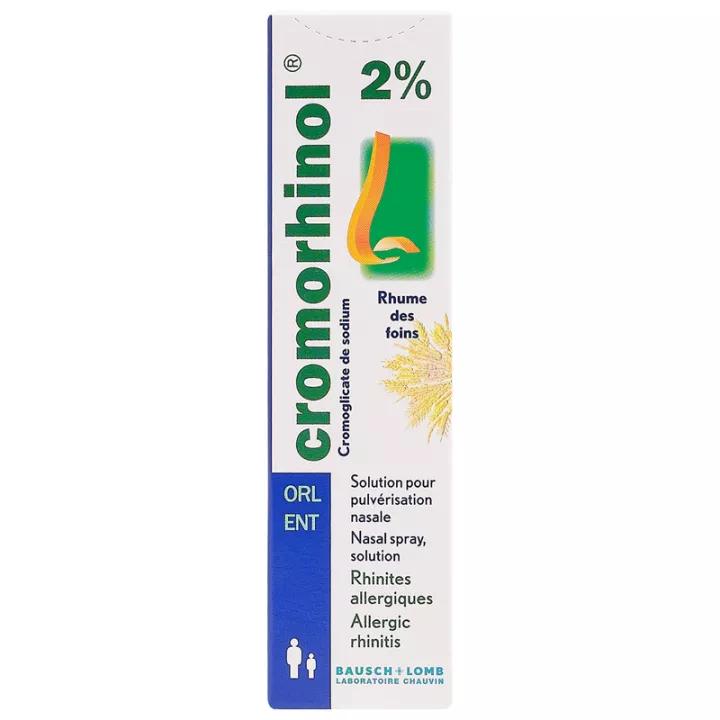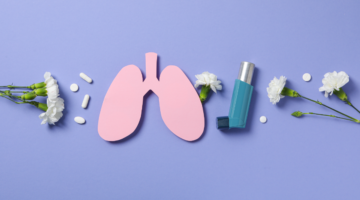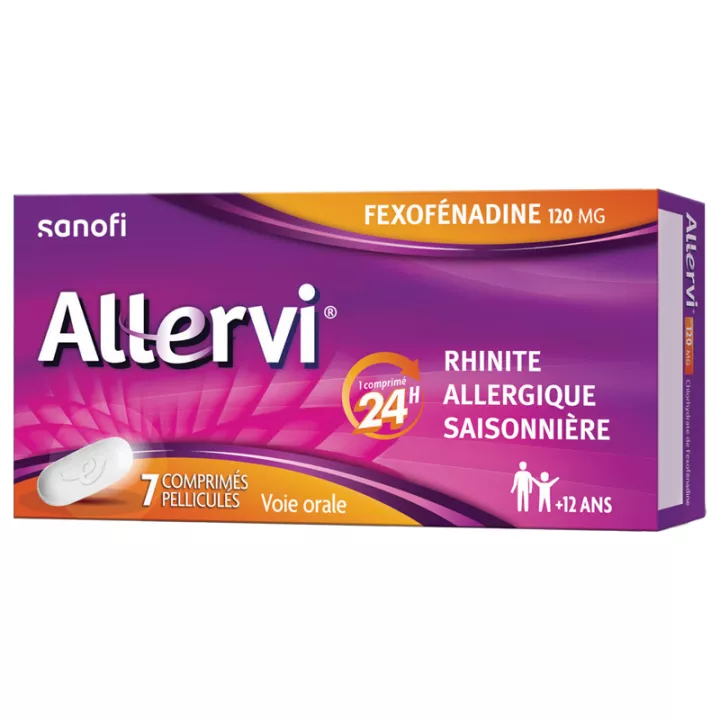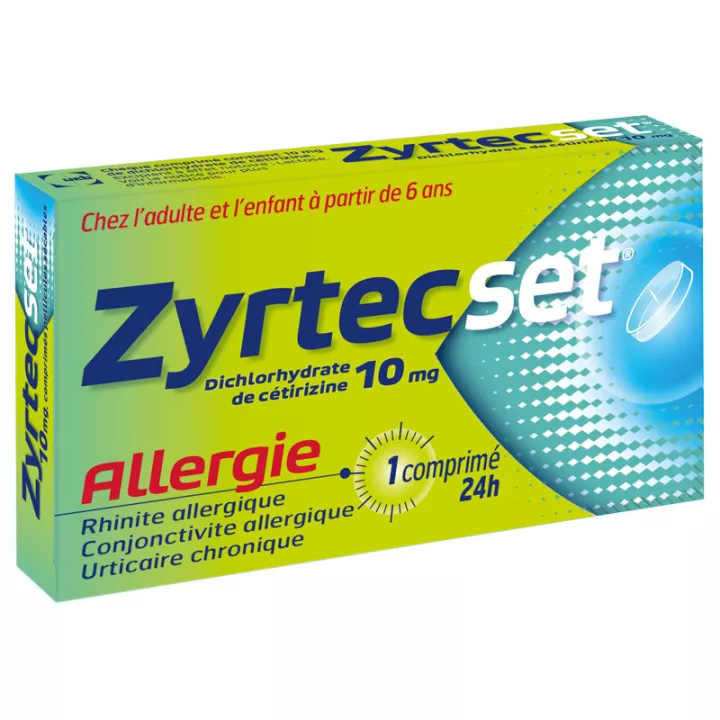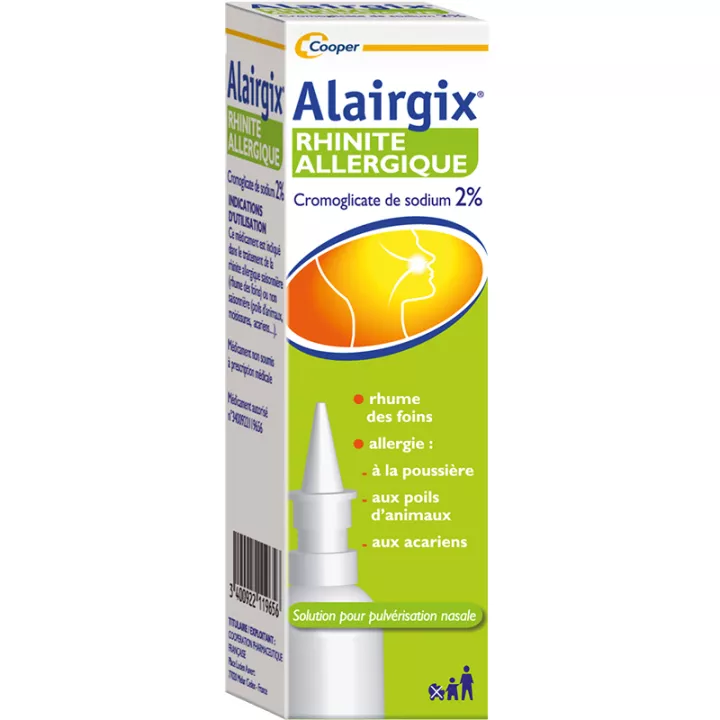NOTICE
ANSM - Updated: 05/10/2017
Name of the drug
CETIRIZINE EG 10 mg, sucking tablet
Cetirizine dihydrochloride
framed
[For non-prescription medicines:]
Read all of this leaflet carefully before you start taking this medicine because it contains important information for you.
You should always take this medicine exactly as described in this leaflet or by your doctor or pharmacist.
· Keep this leaflet. You might need to read it again.
· Talk to your pharmacist for any advice or information.
· If you get any side effects, talk to your doctor or pharmacist. This also applies to any undesirable effect that is not mentioned in this leaflet. See section 4.
· You should talk to your doctor if you do not feel better or if you feel worse after 3 days.
What does this booklet contain ?
1. What is CETIRIZINE EG 10 mg tablet to suck and in what cases is it used?
2. What you need to know before taking CETIRIZINE EG 10 mg tablet to suck?
3. How to take CETIRIZINE EG 10 mg, tablet to suck?
4. What are the possible side effects?
5. How to store CETIRIZINE EG 10 mg, tablet to suck?
6. Contents of the package and other information.
1. WHAT CETIRIZINE EG 10 mg, tablet to suck AND WHAT IT IS USED FOR
Pharmacotherapeutic class - ATC code: <{code}>
Cetirizine dihydrochloride is the active substance of CETIRIZINE EG.
CETIRIZINE EG is an antiallergic drug.
In adults and adolescents over 12 years, CETIRIZINE EG is indicated:
· for the treatment of nasal and ocular symptoms of seasonal or perennial allergic rhinitis,
· for the treatment of symptoms of chronic urticaria (chronic idiopathic urticaria).
Medical advice is recommended for chronic idiopathic urticaria.
2. BEFORE YOU TAKE CETIRIZINE EG 10 mg tablet to suck?
Do not take CETIRIZINE EG:
· if you have severe kidney disease (severe renal impairment with creatinine clearance less than 10 ml / min)
· if you are allergic to the active substance of CETIRIZINE EG or any of the other ingredients (excipients), hydroxyzine or piperazine derivatives (related substances in other medicines).
Warnings and precautions
Take special care with CETIRIZINE EG 10 mg, sucking tablet:
If you have kidney failure, ask your doctor for advice; if necessary, you will need to take a lower dose. The appropriate dosage will be determined by your doctor.
If you have epilepsy or if you are at risk for seizures, ask your doctor for advice.
There is no description of any interaction that is likely to have a particular effect in concomitant use of cetirizine (used at normal doses) and alcohol (up to the blood concentration of 0.5 per thousand corresponding to a glass of wine). As with any other antihistamine, however, it is recommended to avoid alcohol intake during treatment.
children
Not applicable.
Other medicines and CETIRIZINE EG
If you are taking or have recently taken any other medicines, including medicines obtained without a prescription, tell your doctor or pharmacist.
Due to the profile of cetirizine, no interaction with other drugs is expected.
CETIRIZINE EG with food and drinks
Food intake does not significantly affect the absorption of cetirizine.
Pregnancy and breast feeding
Ask your doctor or pharmacist for advice before taking any medicine.
As with other medicines, the use of CETIRIZINE EG should be avoided during pregnancy.
Accidental use during pregnancy should not affect the fetus. However, it is preferable as a precaution to avoid further treatment.
CETIRIZINE EG should not be taken during breastfeeding because of its passage into breast milk.
Driving and using machines
Clinical studies have shown no evidence of impairment of alertness, reaction time or ability to drive after administration of CETIRIZINE EG at the recommended doses.
If you are likely to drive a vehicle or handle a potentially dangerous tool or machine, you should not exceed the recommended dose. You must carefully evaluate your response to cetirizine treatment beforehand.
In some sensitive patients, concomitant use of alcohol or other central nervous system depressants may result in decreased attention or ability to respond.
CETIRIZINE EG contains <{name the excipient (s)}>
Not applicable.
3. HOW TO TAKE CETIRIZINE EG 10 mg, tablet to suck?
How and when should you take CETIRIZINE EG?
These instructions should be followed unless your doctor has given you different instructions on how to use CETIRIZINE EG.
Follow these instructions, otherwise CETIRIZINE EG may not be completely effective.
Dosage
Adults and adolescents over 12 years old:
10 mg once daily or 1 tablet.
Moderate to severe renal impairment:
In patients with moderate to severe renal impairment, the dose will be reduced to 5 mg once daily and 5 mg once every other day.
If you think that the effect of CETIRIZINE EG is too weak or too strong, consult your doctor.
Administration mode
Oral way.
Place the tablet on the tongue and let it melt before swallowing.
Instruction for a good use:
1. Detach a square from the blister following the pre-cut line.
2. Remove the protective film.
3. Grasp the tablet.
4. Place the tablet on the tongue and allow to dissolve.
The tablet can also be dissolved in a little water before being swallowed.
Duration of treatment
The duration of treatment depends on the type, duration and symptoms and is determined by your doctor.
If you take more CETIRIZINE EG than you should
Contact your doctor if you think you have taken more CETIRIZINE EG tablets than necessary. Your doctor will then decide, if necessary, what action to take.
In case of overdose, the side effects described below may occur with increased intensity. Side effects such as confusion, diarrhea, dizziness, fatigue, headache, feeling unwell, dilated pupils, itching, agitation, sedation, drowsiness, stupor, abnormal increase in heart rate, tremors and urinary retention have been reported.
If you forget to take CETIRIZINE EG
Do not take a double dose to make up for the dose you forgot to take
If you stop taking CETIRIZINE EG
If you have any further questions about the use of this medicine, ask your doctor or pharmacist for more information.
4. WHAT ARE THE POSSIBLE SIDE EFFECTS?
Like all medicines, this medicine can cause side effects, although not everybody gets them.
Since marketing, the following side effects have been reported. Their frequency was defined as: (common: 1 in 100 to 1 in 10 patients, infrequent: 1 in 1000 to 1 in 100, rare: 1 in 10,000 to 1 in 1,000, very rare: less than 1 out of 10,000).
· Hematological and lymphatic system disorders:
Very rare: thrombocytopenia (decreased platelet count)
· General condition disorders:
Frequency: tiredness
· Heart conditions:
Rare: tachycardia (too fast heartbeat)
· Eye disorders:
Very rare: accommodation disturbances, blurred vision, oculogyric crises (uncontrolled circular movements of the eyes)
· Gastrointestinal disorders:
Common: dry mouth, nausea, diarrhea
Uncommon: abdominal pain
· General disorders and administration site defects:
Uncommon: asthenia (extreme fatigue), malaise,
Rare: edema (subcutaneous swelling)
· Immune system disorders:
Rare: allergic reactions, sometimes serious (very rare)
· Hepatobiliary disorders:
Rare: abnormal liver function (increased liver enzymes)
· investigations:
Rare: weight gain
· Nervous system disorders:
Common: dizziness, headache
Uncommon: paresthesia (abnormal sensation in the skin)
Rare: convulsions, abnormal movements
Very rare: syncope, tremor, dysgeusia (taste alteration)
· Psychiatric disorders:
Frequency: drowsiness
Uncommon: agitation
Rare: aggression, confusion, depression, hallucination, insomnia
Very rare: tic
· Renal and urinary disorders:
Very rare: difficulty to urinate
· Respiratory disorders:
Common: pharyngitis, rhinitis
· Skin and subcutaneous tissue disorders:
Uncommon: pruritus, rash
Rare: urticaria
Very rare: edema, fixed pigmented erythema
Reporting of side effects
If you get any side effects, talk to <<> your pharmacist> . This also applies to any undesirable effect that is not mentioned in this leaflet. You can also report side effects directly via the national reporting system: National Agency for the Safety of Medicines and Health Products (ANSM) and the network of Regional Pharmacovigilance Centers - Website: www.ansm.sante.fr
By reporting side effects, you can help provide more information about the safety of the medicine.
5. HOW TO STORE CETIRIZINE EG 10 mg, tablet to suck?
Keep this medicine out of the sight and reach of children.
Do not use CETIRIZINE EG 10 mg, tablet to be sucked after the expiry date which is stated on the carton and blister.
No special storage conditions.
Do not dispose of any medication in the sewage system or in the household garbage. Ask your pharmacist to eliminate medications that you no longer use. These measures will help protect the environment.
6. CONTENTS OF PACKAGING AND OTHER INFORMATION
What CETIRIZINE EG 10 mg tablets contain to suck
· The active substance is:
Cetirizine dihydrochloride ............................................... ............................................... 10 mg
· The other ingredients are: Betadex (contains glucose), povidone, sodium cyclamate, cellulose powder, monosodium citrate, microcrystalline cellulose, magnesium stearate, apple flavor (contains especially maltodextrin)
What CETIRIZINE EG 10 mg suck tablet looks like and contents of the pack
Marketing Authorization Holder
EG LAB - LABORATORIES EUROGENERICS
THE QUINTET - BUILDING A
12, DANJOU STREET
92517 BOULOGNE BILLANCOURT CEDEX
Operator of the marketing authorization
EG LAB - LABORATORIES EUROGENERICS
THE QUINTET - BUILDING A
12, DANJOU STREET
92517 BOULOGNE BILLANCOURT CEDEX
Maker
LOSAN PHARMA GmbH
OTTO-HAHN-STRASSE 13
79395 NEUENBURG
GERMANY
or
FAMAR SA
7 ANTHOUSSA STR.
15344 ANTHOUSSA
ATHENS
GREECE
Names of the drug in the member states of the European Economic Area
Not applicable.
The last date this leaflet was revised is:
[to be completed later by the holder]
<{MM / YYYY}> <{YYYY month}.>
Other
Not applicable.
Detailed information on this medicine is available on the ANSM website (France).
Health Education Council:
a) What is allergic reaction, what is an allergic reaction?
Allergy is an overreaction of our body to substances that we consider harmful: allergens. Allergens are the factors and substances that trigger the allergy and the disorders associated with it.
During repeated and intensive contact with the allergen, an allergic reaction is triggered.
The allergic reaction refers to all the symptoms appearing a few minutes or hours after exposure to allergens. These allergens are derived from plants, animal hair, food, dust mites, mold or are substances of occupational origin.
This allergic reaction causes the release into the body of substances such as histamine responsible for the disorders felt.
Like any allergic disease, it is important to see a doctor at least once. IT WILL IN PARTICULAR DETERMINE THE NECESSITY OF PERFORMING AN ALLERGIC BALANCE SHEET.
b) How to recognize allergic rhinitis, seasonal or non-seasonal allergic conjunctivitis, acute localized urticaria?
Allergic rhinitis results in the following symptoms: successive sneezing, colorless nasal discharge, nasal obstruction (stuffy nose), itching and tingling of the nose. It may be accompanied by irritation of both eyes (watery eyes, redness), throat and nose.
We distinguish:
· Seasonal allergic rhinitis or hay fever : they occur every year in the same season, when the concentration of pollen increases in the air. These allergies due to pollen are very common and usually occur for the first time during adolescence. They are repeated each year at the same time, depending on the presence of the pollen (s) responsible. However, you are not allergic to all pollen, but to one or more of them only.
· Perennial allergic rhinitis occurs throughout the year and most often depends on household allergens such as mites, dust, mold, pets.
· Allergic conjunctivitis is characterized by tearing and tingling of both eyes.
· Acute localized urticaria results in itching, redness, edema (swelling).
c) Some practical tips
Removing the allergen (it's crowding out) is the measure of choice to suppress or reduce the symptoms of allergy.
For household allergens: it is essential to take steps to reduce the presence of allergens:
· The mattress should be completely surrounded by a plastic dust mite cover and the pillows. The bed base, unless it is slatted or metal, should be surrounded by a plastic. All bedding should be washed twice a month at 60 ° C if possible.
· The room should be ventilated and cleaned regularly.
· On the floor, avoid descents of bed and carpets.
· Avoid pets.
During the pollen season, it is possible to reduce pollen exposure:
· In your garden, diversify the plantations avoiding the most allergenic species (cypress, cedar, birch ...),
· Avoid mowing the grass yourself during the pollen season,
· Garden preferably with glasses and a protective mask.
